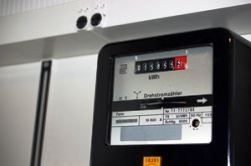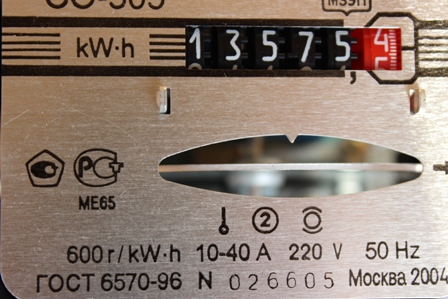Categories: Electrician Secrets, Electrician at home
Number of views: 181,225
Comments on the article: 17
How to choose the right meter
 We deal with the types and capabilities of electric meters and choose which one can and should be bought.
We deal with the types and capabilities of electric meters and choose which one can and should be bought.
Increasingly, energy companies by hook or by crook make their customers change old electric meters. Formally, this is due to the fact that the old electric meters had an accuracy class of 2.5 and could not take into account the energy consumption of small capacities. For example, this is the power consumption of electronic equipment in standby mode. New electric meters have an accuracy class of at least 2 (2; 1; 0.5).

Induction meters
According to the principle of operation, electric meters are divided into induction and electronic. There are two coils in induction meters: a current coil and a voltage coil. The magnetic field of these coils causes the disk to rotate, which drives the mechanism for counting the energy consumed. The higher the current and voltage in the mains, the faster the disk rotates and the meter readings increase.
The problem with this type of meter is that it is very difficult and expensive to ensure with them an accuracy class higher than 2. Their main advantage is the highest reliability and a service life of more than 15 years. To date, only in the Russian Federation there are about 50 million such meters.
Electronic meters
Electronic meters They work due to direct measurement of current and voltage and digital data transmission to the indicator and to the counter memory. Electronic meters have many advantages. These are compact sizes, the possibility of multi-tariff metering, the ability to integrate into commercial metering systems due to the availability of standard interfaces, an easy transition to a higher accuracy class due to the use of specialized microcircuits, ease of reading due to the use of a digital indicator, and increased resistance to attempts to steal electricity for counter correction meter reading, etc. The main disadvantages of electronic meters are a higher price and lower reliability.
GOSTs and established traditions
The first electronic meter was made with us back in 1996 (in the West before, our backlog is at least 15 years old). On January 1, 1996, GOST 6570-96 entered into force, making meters with an accuracy class of 2.5 and a current of less than 30A outlawed. These changes are long overdue, because our apartments are full of appliances with a consumption current of 1-2 kW (electric kettles, microwave ovens, washing machines and dishwashers, heaters, water heaters, etc.). In 2000 An order is issued by RAO UES of Russia, which prescribes equipping housing and communal services with modern meters with an accuracy class of no worse than 2.0 and with an operating current of more than 30A.
Modern tendencies
Foreign manufacturers and operators faced the problem of replacing the old fleet of meters before us. At first they, too, enthusiastically rushed to replace induction meters with electronic ones, which became 95%, but faced with a problem of lower reliability, the need for quick service, they changed their minds somewhat. Now the ratio of induction and electronic meters, for example, in England is approximately 40/60.
We also have both types of meters in our stores. Both organizations and individuals buy both. Regarding reliability, we can say the following: a passport for an electronic meter often gives a resource of 15 years of continuous operation, but not one really has worked so much. Fifteen years ago they were not yet released. The resource of the induction counter is such that even after 50 years, many samples fit into a given accuracy class! This has been tested empirically.
Which meter to choose
An alternative to induction and electronic meters should be decided by the buyer based on the necessary consumer properties of the meter. Before choosing an electric meter, you need to determine whether it is possible and necessary to take full advantage of electronic meters and not pay attention to their shortcomings. It is clear that not everywhere the advantages of electronic meters are so important and often the disadvantages of induction are absolutely uncritical.
Problems of choice of electric meters. Sorted out together
1. The cost of meters with accuracy class 1-0.5 is significantly higher than meters with class 2.0. For a class 2.0 meter, it’s enough. I immediately recall the advertising slogan: "If there is no difference, why pay more?"
2. Maintaining a high accuracy class under conditions of rapidly changing loads is an important property of an electronic meter, but it can only be realized in an industrial enterprise.
3. Multi-tariff - This is a good addition to the functions of a regular counter. But not in all cities and even regions such a service is implemented. The planned replacement of the meter in 90% of cases is carried out on a single tariff.
4. Opportunity automated accounting, This is a very good feature, but it helps energy companies, and you will overpay for the meter.
5. To reduce costs and provide a competitive advantage, some manufacturers put the cheapest components in electronic meters. The expiration date is not defined. How can such a meter work for 15 years? Imagine now that you have to remove such a counter and look for a service center for it. At this time, your loved ones will be sitting in the dark, without a TV and refrigerator ?! What will they tell you about this ...
6. Is it good to have a counter with a number of functions like a modern cell phone, instead of one, but acting reliably like a Swiss watch? How many of your friends have fully mastered all the functions of even their own phone and use them 100%?
7. In our country energy saving not beneficial for the state and energy companies, as a decrease in consumption is a decrease in their profits. With a constant increase in electricity tariffs, no one wants to introduce modern equipment, because these are unplanned risks and opportunities for loss of profit.
conclusions
Based on the foregoing, we can conclude that at present it is better for an apartment to buy an induction electric meter with an accuracy class of 2.0 and an operating current of at least 50A from a well-known manufacturer.
There is a large selection of such counters in stores. Among them, choose with a large warranty period and a service center in your city. When buying, make sure the availability and integrity of the seals. Ask the seller to indicate in the passport and seal the initial meter reading. Make sure that there are factory stamps in the certificate of verification of the meter.
Read the complete passport for the meter. Ask the seller to compare several types of meters for consumer properties. The choice is yours.
See also at bgv.electricianexp.com
:
